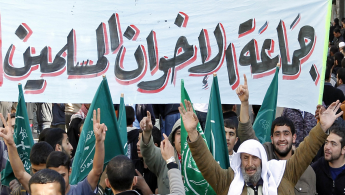Elders blame leaders for Jordan Brotherhood split
A "group of elders" in Jordan's Muslim Brotherhood has said its most recent leadership ignored its advice on how to prevent a recent split and must now face the consequences.
The Muslim Brotherhood split earlier this month after a group of defectors, headed by Abdul Majid al-Thunaibat, was granted a new government licence to create "The Association of the Muslim Brotherhood in Jordan", becoming the defacto legitimate branch in the country.
The "group of elders" said in a statement on Tuesday that the leadership of the old group had ignored its plan to prevent the split, which included the reshaping of its executive bureau and the shura council, and had missed its the chance to restore legitimacy.
The group said: "The partial and delayed response from the group's leadership to the conciliatory initiative... complicated attempts at a solution. What was appropriate two weeks ago... is no longer appropriate today."
The elders' proposal
The elders had presented an initiative that called for Brotherhood comptroller general, Hammam Said, to step down and to head a leadership council made up of previous leaders for a period of no more than one year.
According to the Tuesday statement the initiative, which aimed to "minimise losses", was categorically rejected by Said.
| Despite the efficiency of the current leadership, [the team] believes it is incapable of handling the crisis in these circumstances. Salim Falahat |
Salim Falahat, a member of the elders and former comptroller general, told al-Araby al-Jadeed: "Despite the efficiency of the current leadership, [the team] believes it is incapable of handling the crisis in these circumstances."
"All the initiatives that were presented were rejected, and if they were to be applied today, their chances of success would have decreased now that the situation has further developed and the internal dispute within the Muslim Brotherhood has transformed into an external dispute that has affected multiple parties."
He said he held the leadership responsible for its position and the consequences.
The shura council of the Muslim Brotherhood in Jordan has been in session since Thunaibat's announcement it had been granted a new licence for the group.
However, the council has failed to reach any solution to the crisis, and has issued a series of statements confirming it is continuing to study proposals that have been put forward.
The Muslim Brotherhood in Jordan was licensed in 1946 on the basis that it was a branch of the original Muslim Brotherhood in Egypt.
The new registration for the group obtained by Thunaibat has raised a legal debate regarding the legitimacy of the historical group's existence.
Said, the comptroller general, has said that the group would continue to exist forever and did not need a licence.
This is an edited translation from our Arabic edition.



